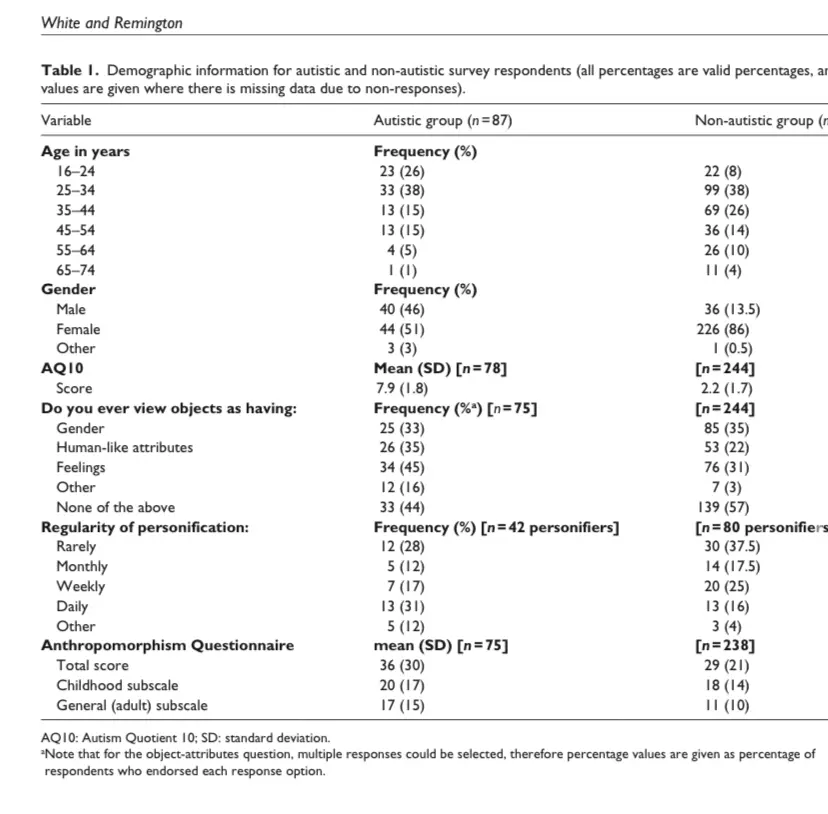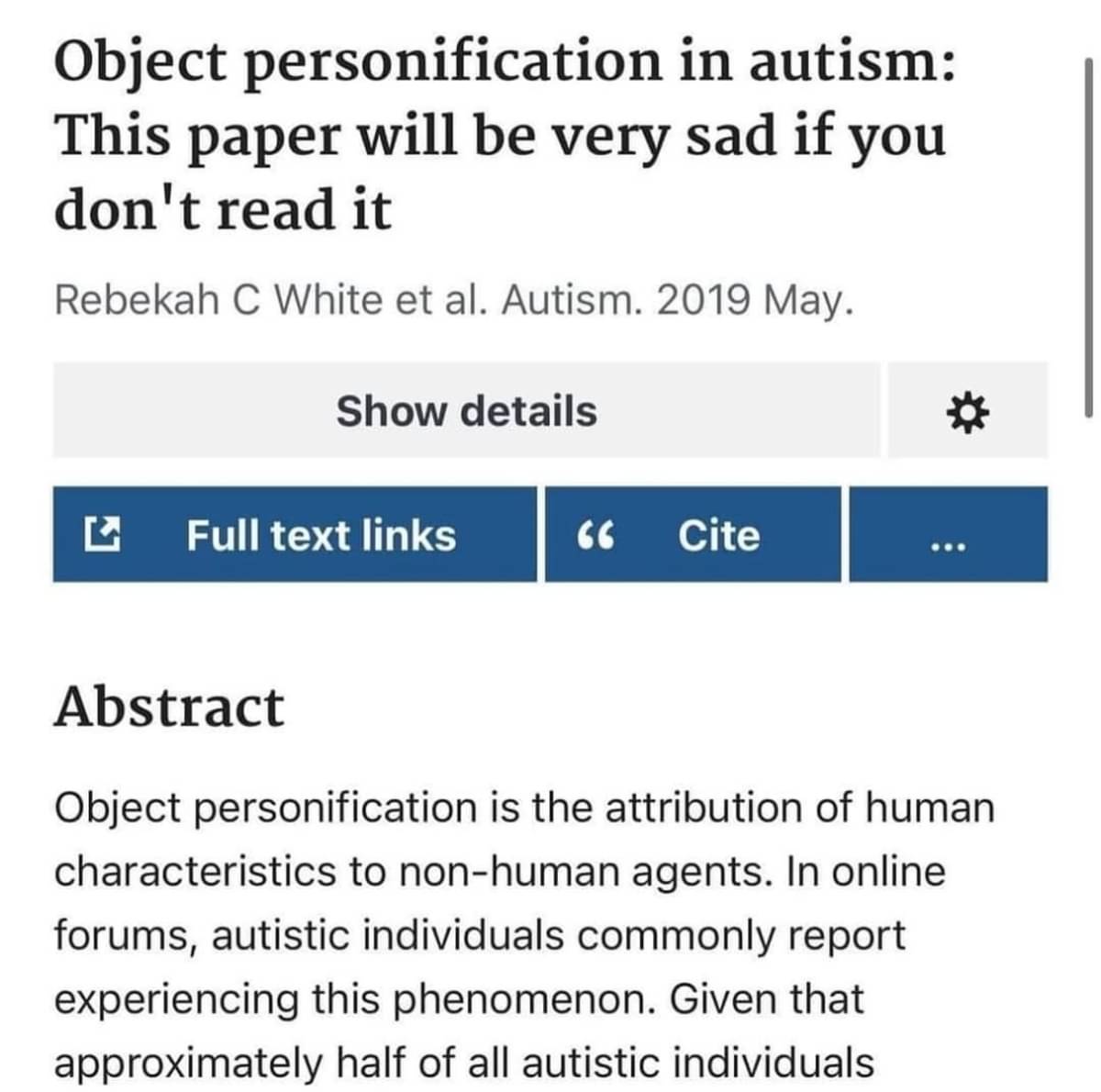Anyone got a link to the paper? I kinda want to read it
Science Memes
Welcome to c/science_memes @ Mander.xyz!
A place for majestic STEMLORD peacocking, as well as memes about the realities of working in a lab.

Rules
- Don't throw mud. Behave like an intellectual and remember the human.
- Keep it rooted (on topic).
- No spam.
- Infographics welcome, get schooled.
This is a science community. We use the Dawkins definition of meme.
Research Committee
Other Mander Communities
Science and Research
Biology and Life Sciences
- !abiogenesis@mander.xyz
- !animal-behavior@mander.xyz
- !anthropology@mander.xyz
- !arachnology@mander.xyz
- !balconygardening@slrpnk.net
- !biodiversity@mander.xyz
- !biology@mander.xyz
- !biophysics@mander.xyz
- !botany@mander.xyz
- !ecology@mander.xyz
- !entomology@mander.xyz
- !fermentation@mander.xyz
- !herpetology@mander.xyz
- !houseplants@mander.xyz
- !medicine@mander.xyz
- !microscopy@mander.xyz
- !mycology@mander.xyz
- !nudibranchs@mander.xyz
- !nutrition@mander.xyz
- !palaeoecology@mander.xyz
- !palaeontology@mander.xyz
- !photosynthesis@mander.xyz
- !plantid@mander.xyz
- !plants@mander.xyz
- !reptiles and amphibians@mander.xyz
Physical Sciences
- !astronomy@mander.xyz
- !chemistry@mander.xyz
- !earthscience@mander.xyz
- !geography@mander.xyz
- !geospatial@mander.xyz
- !nuclear@mander.xyz
- !physics@mander.xyz
- !quantum-computing@mander.xyz
- !spectroscopy@mander.xyz
Humanities and Social Sciences
Practical and Applied Sciences
- !exercise-and sports-science@mander.xyz
- !gardening@mander.xyz
- !self sufficiency@mander.xyz
- !soilscience@slrpnk.net
- !terrariums@mander.xyz
- !timelapse@mander.xyz
Memes
Miscellaneous
This comment will be very sad if you don't interact with it
Downvoting so comment is happy
Wait, other people don't do that? Well, that explains a lot... Since I was a kid, I never understood how people treated their stuff so badly and throw stuff away without a second thought. I take care of my stuff for as long as I can, and almost never throw anything away. They're like companions who walk with me in my life, and I'm never giving up on an old friend.
I'm not autistic and I feel the same way. It makes me sad to throw something away if it's still got some use in it.
When I was a kid, every letter and number seemed to have a gender to me.
- Male: a, c, d, e, g, h, j, l, m, n, o, p, x, z, 1, 2, 4, 5, 6, 9
- Female: b, f, i, k, q, r, s, t, u, v, w, y, 3, 7, 8
- NB: 0
T is male. M is female and dating Mr. N.
T is a strong, amazonian woman. t is a tomboy skater who likes competitive street boxing.
o uses he/they
lemme guess, this paper is probably pay walled also?
God i love modern science, it's so much fun.
Yes.
incredible, what a fucking shitpost this is.
? shitpost ?
the paper is almost definitely going to be sad given the fact that people can't read it, since it's behind a pay wall.
and just for the record in case you don't know what a shitpost is, it's often a half joking statement, not intended to make an incredibly serious point.
Mother fucker....
I personified numbers all the time, 8 and 9 were based off of Smithers and Burns, 4 and 7 were female 4 was more the girl next door, and 7 was more the "Good bad girl"
I hope i don't make the paper sad by saying this but the numbers are kinda off. (Or i misunderstand)
The only real difference is for below age 24. Then its pretty much the same if not less prevalent for autists.
They point to some other factors about the types of questions that indicate that the differences are underestimated but evidently that didn’t translate in hard numbers.

The actual results are in the text. 56% personifiers among autists vs 33% among not autists, p<0.05. Self report is p=0.06.
I'm pretty sure the age and gender in that table is just showing the frequency of the ages in the sample, not a crosstab of age or gender with personification/anthropomorphism.
So that's saying their autistic population skewed younger than their non-autistic population. Which isn't unsurprising, it's a lot easier to get a diagnosis as a child, and generally easier to get diagnosed now compared to a few decades ago. So people over 35 or so are going to just be less likely to have had the opportunity for diagnosis. The authors do address differences in gender representation between the samples but I don't see age addressed specifically. It could just be that younger people tend to personify/anthropomorphize more, so since the sample of people with autism skewed pretty heavily towards the 16-24 group the results could instead be displaying differences by age. I don't think they quite have the sample size to delve into age too much. I think they'd only be able to get away with doing two groups at 34 & under and 35+. That would be a good start though.
This is also a heavily self-selected population, apparently largely from social media. I'm always automatically skeptical of social media sampling.
I would've liked to see a little more detail about exactly which tests and assumptions they were using. The gender difference looks like they did a t-test, but it's left to the reader to assume they ran a two-tailed t-test. They could easily have bolstered their numbers by reporting the one-tailed test.
As doctor whatshisorherface said, the first percentage is just showing participant age group, as both lists add up to 100%.
I genuinely got separation anxiety after taking my last CRT to the tip.
I misread autism as one of the coauthors, so
Albert "Al" Autism. Most famous scientist in his field
TIL that Japanese people are all autistic.
edit: an explainer as I can see how this sounds insensitive without context (note that I am not Japanese, this is only from what I have come to understand as an outsider looking in)
Japanese folklore, as Shinto, puts forth the idea that inanimate objects can have (or develop?) their own (personified) spirits. This has carried over to modern behaviour and beliefs, where personification of objects is quite common.
Even if most Japanese don't identify as being of Shinto faith/spirituality, and probably don't believe that random inanimate object X has a living spirit within it, items are often treated with great care as though they were to have a spirit. (theory time: maybe this plays a part in why you can often find used items in such good condition in Japan...)
I've noticed a lot of things that are considered autistic in the states specifically may be normal practice in various cultures, having worked with people in Germany, and from a large swath of Asia.
It interests me a bit, but I think the takeaway is that autism tends to manifest in a number of quirks, and the ones that don't align with the current culture the autistic person is in are the ones that are paid attention to. That and there tends to be a bit more obsession over said quirks than in those cultures, sometimes to the detriment of the autistic person or their social life.
I came here looking for a discussion about a link between Autism and animism (as being the oldest known spiritual practice).
I think your just talking about animism and confusing the relation
Oh I agree there's probably no relation. Reading this I just found the overlap between autistic tendencies and Japanese cultural tendencies to be interesting, not indicative of anything else.
I agree, the overlap is very cool!
That title is amazing
Another day, another autism I have...
So Brave Little Toaster's writer probably was ASD?
A writer whom Kirby scarred somehow
Now I have to read the rest
That poor, sad little paper
It's going to be happy once I read it all
